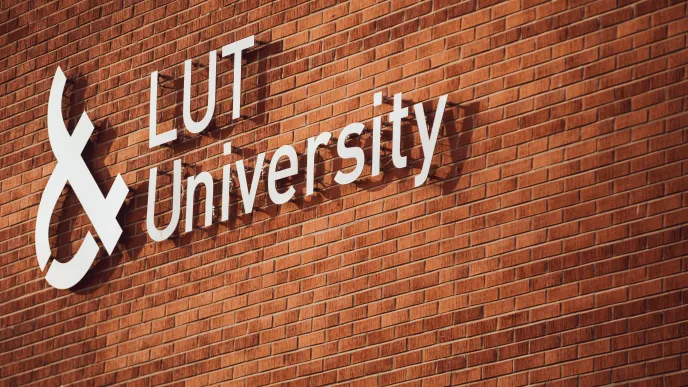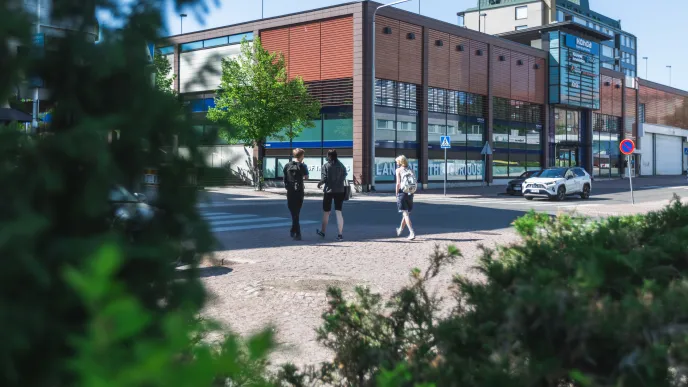The newsletter is your guide to what's happening on LUT campuses and the student community as well as to bachelor's and master's programmes updates and admission instructions. Newsletters will be delivered to your email once a month.
The world is changing faster than ever before. Between the rapid changes in digitalisation, automation, artificial intelligence, and robotics and their constant presence in our lives, it is easy to forget that innovation is driven by humans for humans. Focusing on human-centred change at both the individual and organisational levels will continue to be the main asset of organisations all over the world. Enabling interaction is important for achieving innovation in organisational development and cooperation.
Transitions are complex, systemic shifts in industries or societal functions. They involve changes at multiple levels from one socio-technical system to another, requiring technology and society to evolve together. Successful managers understand these dynamics and enable collaboration to drive innovation.
The programme aims to provide students with a systemic vision on development in organisations and the skills and capabilities for leadership, critical thinking, and managing change. The programme takes a multidisciplinary approach to the management of organisational development. It teaches students to analyse, understand, and lead company processes and to apply technological, economic, and human knowledge to resolve real-life industrial, business, and organisational problems.
In this programme, you will gain expertise in industrial engineering and management and an in-depth understanding of change, leadership, development, well-being, and innovation. Close collaboration with industrial companies and other organisations and networks will ensure the practical worldwide application of new knowledge and theories.
Who is this programme for?
This programme is for you if you are interested in human-centred change in industrial engineering and management and want to gain a multidisciplinary understanding of organisational transformation and networking.
In addition, you have
- a bachelor’s degree in technology or business;
- a desire to understand and address real-world business and organisational challenges in sustainable and innovative ways;
- a background or completed courses in industrial engineering and management, business, process development, leadership, organisational culture, well-being, innovation, project management, creativity, digitalisation, etc.
Admissions guide 2026
What will you learn in the programme?
As a graduate of the programme, you will understand the complexity of change at individual, organisational, and network levels – globally. You will also learn to lead change initiatives that bring together people from diverse backgrounds and fields of expertise.
This programme focuses on key areas of industrial engineering and management, including management and leadership, creativity and innovation, futures thinking and foresight, transformation, and sustainability. You will also gain practical knowledge and skills in decision-making, strategic thinking, systemic visioning, entrepreneurial approaches, goal-setting, problem definition, and networking. The programme is designed to help you adopt a forward-looking mindset.
As a graduate, you will have
- the ability to analyse, understand, and lead organisational processes while applying technological, economic, and human knowledge to solve real-life challenges in industry and organisations. Knowledge of leadership roles and practices will help you manage the complexity of human-centric organisations and networks;
- skills to navigate proactively in a socio-technical environment. You will learn to identify opportunities and challenges arising from societal and technological changes by balancing technology and economics. This builds resilience and supports envisioning possible futures for better decision-making in organisations and networks;
- the ability to apply diverse quantitative and qualitative methods—such as data analysis, impact assessment, creativity and arts-based methods, gamification, and foresight research—for innovative organisational and network development;
- transferable skills, including teamwork, effective communication, relationship-building, and problem-solving;
- a professional and international network of fellow students, scholars, experts from various fields, and company representatives through projects and assignments.
Degree structure and studies
The Master's Programme in Management of Organisational Development takes two years. It leads to the degree of Master of Science in Technology, M.Sc. (Tech.), which is 120 ECTS credits.
The programme includes core studies, advanced specialisation studies, and minor and elective studies. Advanced specialisation studies include a master's thesis. Read more in this academic year’s curriculum.
Depending on your previous studies, you might be assigned supplementary studies. Please check the programme-specific requirements carefully before applying.
Career prospects
The master's programme prepares you for a career in industrial engineering and management. You will be ready for jobs that combine engineering and business, apply human-centred approaches to change and innovation, and manage sustainable renewal.
After graduation, you will be equipped to work in international and multidisciplinary environments.
Possible positions include development manager, innovation consultant, continuous improvement manager, project engineer, innovation specialist, and researcher.
You can find jobs in large companies, SMEs, government organisations, and research institutes. You will also have a firm basis for doctoral studies in technology.
Contact Admissions Services
The LUT Admissions Services are here to assist you in all matters related to applying to international bachelor's and master's programmes.
For questions about admission criteria or entry requirements, please reach out to us by email: admission@lut.fi.
Chat with our students
Do you want to know more about studying at LUT, student life, or housing on LUT's campuses?
For questions about admission to bachelor's or master's degree studies, please email admission@lut.fi.




